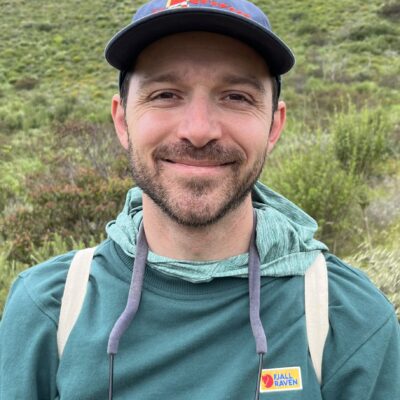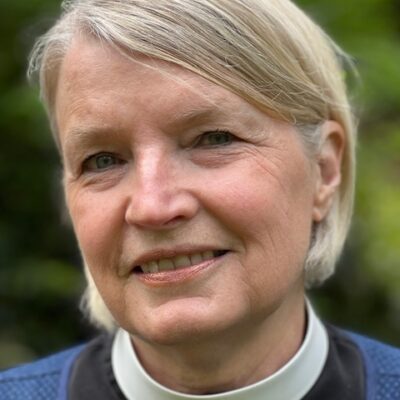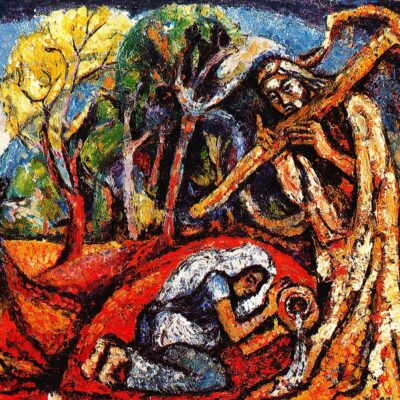The Sermon on the Mount is essential for Christian ethics. It contains some of the most memorable sayings from Jesus and is the first long discourse attributed to him in Matthew’s gospel. The Beatitudes kick it off. These eight “Blessed are” statements describe a reality that only Jesus sees clearly and provide a description of the qualities he will bring to his life and ministry and that he expects to see in those who would be his disciples.
But here’s the deal. This is not a “to do” list. You can’t make yourself poor in spirit or meek or even persecuted. Every time I study this passage with others, someone will inevitably say, “I need to try harder and do more.” It breaks my heart because I think this is exactly the opposite reaction that Jesus expected.
Jesus has gone up the mountain. He’s followed by those who are already attracted to him and who want to be near him. They gather round and as Jesus looks out at them, at each of them specifically and also as the group who will become his disciples, he sees them. He recognizes as the Apostle Paul did, that “not many of you were wise by human standards, not many were powerful, not many were of noble birth.” Indeed some might be considered foolish, weak, lowly or despised by others. Jesus looks at them and sees a reflection of himself – poor in spirit, sorrowful, meek, hungering for justice, merciful, pure in heart, peacemakers and ultimately, those who are persecuted.
The Beatitudes are more description than they are instruction. They describe the community that forms around Jesus. As Stanley Hauerwas writes in his commentary on Matthew’s gospel, “The sermon is not addressed to individuals but to the community that Jesus begins and portends through the calling of the disciples. The sermon is not a heroic ethic. It is the constitution of a people. You cannot live by the demands of the sermon on your own, but that is the point. The demands of the sermon are designed to make us depend on God and one another.”
I looked back through all my sermons to find ones that included the Beatitudes. Every time All Saint’s Sunday rolls around in November we hear the Beatitudes so I have many sermons preached on the occasion of a baptism. This is a great text for new life in Christ, a description and reminder of what it means to “walk wet.”
I found a number of wedding sermons where the couple chose this text. Our own dear Julia and her beloved Chris were married in the chapel with the Beatitudes. And just a couple years ago, Nancy Rogers and Mac chose the Beatitudes when they were married at age 87. It’s not hard to imagine these relationships as blessed and as a blessing to many others. In this case, blessed also means “happy” and anyone who has had the pleasure of being around these couples share in that happiness.
Then I realized that the Beatitudes show up many more times in sermons that I have preached at funerals, and particularly at the funerals of those who were on the margins of life. These are people who the world would not consider blessed if blessing means success, money, security and comfort. I have preached at many services for those who were unsheltered or formerly homeless. Often there is no one to choose the readings for them and I have suggested the Beatitudes. For those who remember them, this was the reading for the funerals of Brother Isaac, Random “Mr. President” and for our own dear Robert Loomis.
Brother Isaac was so meek and humble that he lived as a very poor man and yet left this church a bequest which we will use to build affordable housing with. Random could often be heard loud and upset over another example of injustice that he was trying to fight often on behalf of someone who was weaker than him. And Robert had a purity of heart and love for Jesus that always had him looking out for others, often to his own detriment. He ran the kitchen at Edible Hope for a number of years and no one was ever turned away. Their lives were complicated and yet, I believe they were and are the blessed and beloved of God.
As we hear the news of this past week, there is a collective sorrow over the many lives taken by violence. There have been mass shootings, deaths in Ukraine from the bombing of civilians, deaths from fentanyl overdoses in King County at three times the rate of deaths from COVID and the beating to death of Tyre Nichols by the police. Power, greed, violence, addiction, inequality are some of the curses of our society. They rob us and the planet of beauty, joy and life.
In the middle of the turmoil, anger and grief, I imagine Jesus looking at those weighed down and oppressed by all these forces of evil and seeing, really seeing the ones he loves and sacrificed himself for. Blessed are the mothers who mourn. Blessed are those who hunger and thirst for righteousness and who stand up for justice. Blessed are those whose spirits have been crushed by poverty, addiction and mental illness. Blessed are those who will not be conquered by war and who fight for peace.
Some of you are familiar with the Women in Black and the Homeless Remembrance Project. They have worked for years to bring the suffering and death of those who are living unsheltered to the attention of politicians and ordinary citizens by holding vigil in front of City Hall. Every year on the Winter Solstice, the longest and often coldest and wettest night of the year, we hold a large vigil in honor of everyone who has died that year from violence, overdose and natural causes while unsheltered.
We gather in the plaza at the base of the steps of City Hall just before the end of the work day. For the past few years, downtown has been very quiet with few people passing by. A few make short speeches. I offer a prayer. We read the names of every person who has died, including those who are listed as “unidentified.” The group is a mish mash of activists, folks from the WHEEL women’s shelter, the formerly and currently homeless, people who work for agencies serving the unsheltered, clergy and some friends and family members of those who have died. We’re a rag tag bunch, bundled up and masked. We use a megaphone but it’s hard to hear and the cold is making it miserable.
After the speeches, we’re handed candles with a paper cup to prevent the wind from blowing them out. We get hand written signs with names upon names of those who have died. 2022 set a record of 310 for the number of people who died on the streets, including just that day a 27 year old who died in front of the Ballard Library. He lay there for 2 hours while another homeless man, Mike, tried to get someone to let him use their phone to notify 911.
Eventually we take up our spots on the long, wide stairs that take people up from 4th Avenue to 5th where the main entrance to City Hall is. I have my hat and gloves on and my hood pulled up. Just behind me is a Mother whose 30 year old son died by overdose. She is joined by her other children and a friend. A man who himself appears to be unsheltered has managed to light his cup and then a pile of other things on fire. We stamp it out.
Otherwise we are silent. We huddle into our bundles of clothing, illuminated only by weak streetlights and a fragile candlelight. The city goes by. Few notice. No one stops. Most refuse the flyer explaining the vigil. This is the only memorial service that will be held for most of those who have died. We are the official mourners for over 300 people. It’s dark. It’s cold and my feet are freezing. I’m supposed to stand here for just one hour and it’s tempting to leave early as some have already done. After all, what good does this do? I have been participating in this for 8 years and the numbers just keep going up.
I imagine Jesus at the bottom of the steps. He would probably look like just another homeless guy. There is nothing about his appearance to distinguish him. He doesn’t shine with radiance as at the Transfiguration or have the beam of the Holy Spirit upon him as at his baptism. He’s not going to change the container of water into wine or even hot coffee. He simply stands there in the cold and dark and looks up. What does he see? When he reads all the names of the deceased does he see them? Does he see the entirety of their lives from birth to death? Was he there for their joys and sorrows? Did he know their hearts? Does he see them still? Are they with him in eternity?
Does he see me? Does he know I’m tired and cold and want to go home? Does he know how many times I’ve ignored or deflected someone in need? Does he know my petty grievances and my greater failures? Can he see behind the careful mask to my fears and weaknesses, my shame and vulnerability? He looks into my heart. He sees into the souls of those gathered there, both the living and the dead. And then he opens his mouth.
“Blessed are you.”






Leave a Reply